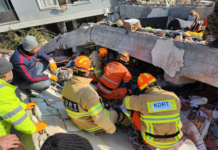
Prime Minister Lee Nak-yon attends a commemorative ceremony to mark the 38th anniversary of the May 18 Gwangju Democratization Movement, and pays his respects at the May 18 National Cemetery, in Gwangju, Jeollanam-do Province, on May 18.
By Park Hye Ri and Hahm Hee-eun
Photos = Ministry of Patriots and Veterans Affairs
A commemorative ceremony to mark the 38th anniversary of the May 18 Gwangju Democratization Movement took place at the May 18 National Cemetery in Gwangju on the morning of May 18. Around five thousand people, including Prime Minister Lee Nak-yon, other government representatives, common citizens and students attended the ceremony, hosted by the Ministry of Patriots and Veterans Affairs.
The May 18 Gwangju Democratization Movement was an uprising of Gwangju citizens that demanded the establishment of a democratic government, the withdrawal of the dictatorship’s military forces, and an abolition of martial law. It lasted from May 18 to 27, 1980.
This year’s commemorative ceremony, which was held under the theme of “Gwangju’s May Holds Up Justice,” started with Jeon Ock-joo, also known as Jeon Chun-shim, who recreated the situation of May 18, 1980. Then there was a screening of the movie “Taxi Driver” (택시운전사) (2017) and of the film “May 18″ (화려한 휴가) (2007), which tells the story of a father who has been searching for his son, Lee Chang-hyun, who was 8-years-old at the time, for 38 years.

Martha Huntley, wife of Charles Betts Huntley (1936-2017), a late U.S. missionary who documented the Gwangju uprising, reads a letter out loud at the commemorative ceremony on the 38th anniversary of the May 18 Gwangju Democratization Movement, at the May 18 National Cemetery in Gwangju, Jeollanam-do Province, on May 18.
The ceremony was also attended by non-Koreans who took part in the May 18 Gwangju Democratization Movement.
Edeltraut Brahmstaedt, the wife of Jürgen Hinzpeter (1937-2016), a German journalist who shared the scenes of democratization with the world through his news coverage, and Barbara Peterson, the wife of Reverend Arnold Peterson (1944-2015), a U.S. Baptist missionary who testified about the scene of massacres and helicopter shootings, and Nandana Manatunga, a Roman Catholic priest who received the 2018 Gwangju Human Rights Award, were all at the ceremony.
Martha Huntley, wife of Charles Betts Huntley (1936-2017), who tried to inform the world about the truth of the May 18 Gwangju Democratization Movement, read a letter to her husband during the ceremony.
Marth Huntely recalled that, “Although Gwangju was a disaster itself, the humanity of the Gwangju citizens was passionately lit. Gwangju is now the name for justice, and our love for Korea is endless.”
President Moon Jae-in said in a social media update that, “The May 18 Gwangju Democratic Movement showed the most humane aspects at the most desperate moments. Thanks to the democratic movement, we have a liberal country today that doesn’t forget about justice.”
President Moon emphasized that, “The Candlelight Revolution was the revival of the May 18 Gwangju Democratic Movement, and through the power of justice, this government was born. I will not forget that Korea’s existence is owed to the individuals who are remembered as ‘Gwangju.’”
hrhr@korea.kr























